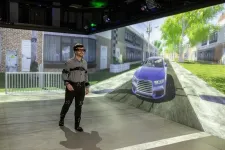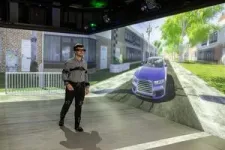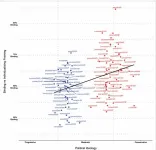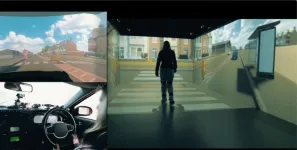(Press-News.org) Self-driving revolution hampered by a lack of accurate simulations of human behaviour
Algorithms that accurately reflect the behaviour of road users - vital for the safe roll out of driverless vehicles - are still not available, warn scientists.
They say there is “formidable complexity” in developing software that can predict the way people behave and interact on the roads, be they pedestrians, motorists or bike riders.
To improve the modelling, a research team led by Professor Gustav Markkula from the Institute of Transport Studies at the University of Leeds has developed the first-ever simulation of how people behave on the roads based on key cognitive theories.
Those separate theories were integrated into a larger, single psychological model that would “describe behaviour in more complex, real-world tasks”.
During computer tests, the model accurately reproduced various well-known but not previously understood behaviours of pedestrians and drivers in common road scenarios. The model also predicted how real-life human subjects would behave when facing interactive situations in a virtual reality simulator.
Professor Markkula said: “These findings suggest that everyday road user behaviour relies on a number of complex underlying cognitive mechanisms, which may be part of the reason why it has been more difficult than expected to create self-driving vehicles.”
“Our research shows that it is possible to integrate separate theories from psychology into combined theories for applications such as simulating the way people behave in traffic, which is something which has been called for but rarely achieved.”
The researchers' findings - Explaining human interactions on the road by large-scale integration of computational psychological theory - are published today (Tuesday, June 20) in the scientific journal PNAS Nexus.
Algorithms needed to unlock self-driving revolution
The development of automated vehicles could have a major impact on the UK economy.
In a vision statement, the UK Government has said driverless vehicles will launch a £42 billion industry and create 38,000 new jobs. The aim is to see the start of the safe roll out of driverless vehicles by 2025.
But writing in the scientific journal PNAS Nexus, the researchers argue that work towards driverless vehicles has been “hampered by a lack of models of how human road users interact”.
Accurate models are needed to run simulations necessary in both development and testing of driverless vehicles and their control systems, for example to demonstrate that the vehicles remain safe when confronted with a range of human behaviour on the road.
Up to now, most computer models of road user behaviour have been statistically based, with predictions of how people might behave based on analysis of large datasets, but typically without analysing those models at a detailed behavioural level.
The research by Professor Markkula and his team has instead focused specifically on the details of human behaviour and key concepts in human psychology.
Road user behaviours and theories
The researchers looked at several typical human behaviours that exist on the road, such as hesitation in unclear situations, or implicit communication using vehicle or body movement to assert priority or to encourage someone else to go first.
The model predicts how people will behave by reference to key cognitive theories. For example, one is “theory of mind”, where people will form beliefs about what someone else is doing and how their own behaviour may affect decisions being made by the other. This relates also to “behavioural game theory”, explaining how people consider the combined effects of their own behaviour and the behaviour of others when deciding what to do.
Another theory incorporated in the model describes imperfect human perception, requiring people to take time to assess and understand what is going on in their environment.
Testing with human participants in the laboratory - including the HIKER pedestrian simulator at the University of Leeds Virtuocity facilities - revealed that the new psychological-theory based model could also make correct predictions about driver-pedestrian interaction scenarios studied in the experiments.
Professor Markkula, who holds the chair in Applied Behaviour Modelling at Leeds, added: “Our research has shown that, by taking a number of existing but separate mathematical theories about human psychology and behaviour, and putting these together, we can model - in much more detail than previously possible - how humans interact in road traffic, for example as drivers or pedestrians, including phenomena such as hesitation and interpretation of others’ intentions.”
In the paper, the researchers say that much work remains to be done in the development of psychological based models of road user behaviour.
The overall aim, say the researchers, is to develop computer models that better reflect the human dimension to behaviour on the roads.
The authors of the paper – Explaining human interactions on the road by large-scale integration of computational psychological theory – are Gustav Markkula, Yi-Shin Lin, Aravinda Srinivasan, Jac Billington, Matteo Leonetti, Amir Hossein Kalantari, Yue Yang, Yee Mun Lee, Ruth Madigan, and Natasha Mera. Matteo Leonetti is from Kings College London – the others are based at the University of Leeds.
END
END
Self-driving revolution hampered by a lack of accurate simulations of human behavior
2023-06-20
ELSE PRESS RELEASES FROM THIS DATE:
Toxic emissions from wildland-urban interface fires
2023-06-20
Fires in the wildland-urban interface (WUI) emit more toxic smoke than wildfires burning in natural vegetation, due to the chemicals in the structures, vehicles, and other manufactured goods that burn in fires in areas of human habitation. Amara Holder and colleagues surveyed the literature on emissions from urban fuels, finding 28 experimental studies that reported emission factors—emissions per unit of fuel burned—for various items, such as home furnishings, consumer electronics, and vehicle ...
Electing progressives with patriotism, family, and tradition
2023-06-20
Economically progressive candidates may fare better in US elections when delivering their message in terms of “binding values” such as patriotism, family, and respect for tradition, according to a study. Although large majorities of Americans favor increasing economic equality in the United States, candidates who promote policies intended to reduce economic inequality, such as raising the minimum wage or increasing access to health care, often fare poorly at the ballot box. One reason for their under-performance may ...
Locating executive functions in fish brains
2023-06-20
The telencephalon is the part of the brain responsible for executive functions in fish, according to an experimental study. Zegni Triki and colleagues used guppies (Poecilia reticulata) that had been selected over five generations to have smaller or larger telencephalons, resulting in a 10% size difference between “up selected” and “down selected” lines of fish. Total brain size was not significantly affected. The authors then presented 48 male fifth-generation fish from both lines with tests of cognitive flexibility, inhibitory control, and working memory—the three commonly accepted components ...
Modeling human behavior for autonomous vehicles
2023-06-20
A model of human psychology could help self-driving cars interact with human drivers on the road, according to a study. Gustav Markkula and colleagues combined several computational psychological models into one master-model to simulate pedestrians attempting to cross a busy road and the human drivers on that road. The goal of the model was to capture the underlying cognitive mechanisms responsible for observed behavior. Computational models of Bayesian perception, theory of mind, behavioral game theory, long-term valuation of ...
Cholesterol lures in coronavirus
2023-06-20
A recent study unveiled the doorway that SARS-CoV2 uses to slip inside cells undetected.
SARS-CoV-2 uses the receptor angiotensin-converting enzyme 2, or ACE2, to infect human cells. However, this receptor alone does not paint a complete picture of how the virus enters cells. ACE2 is like a doorknob; when SARS-CoV-2 grabs it and maneuvers it precisely, this allows the virus to open a doorway to the cell’s interworking and step inside. However, the identity of the door eluded scientists.
Scott Hansen, an associate ...
2023 Warren Alpert Foundation Prize honors pioneer in computational biology
2023-06-20
The 2023 Warren Alpert Foundation Prize has been awarded to scientist David J. Lipman for his visionary work in the conception, design, and implementation of computational tools, databases, and infrastructure that transformed the way biological information is analyzed and accessed freely and rapidly around the world.
The $500,000 award is bestowed by The Warren Alpert Foundation in recognition of work that has improved the understanding, prevention, treatment, or cure of human disease. The prize is administered by Harvard Medical School.
Lipman will be honored at a scientific symposium on Oct. 11, 2023, hosted by HMS. For further information, visit ...
How good or evil are you when gaming?
2023-06-20
Two papers published by Macquarie University researchers reveal that most of us ignore the meter when a moral choice is clear, but we use it when the choice is more morally ambiguous. And some of us, about ten per cent, will do anything to win.
You are playing The Great Fire, a narrative computer game. It’s all about Frankie, an usher in a cinema in regional Australia in the 1940s, who is confronted by a murderous psychopath.
Along the way, players have to make choices which affect the progress and outcome of the game. Some are simple black and white decisions, such as ...
Walkable neighborhoods help adults socialize, increase community
2023-06-20
Adults who live in walkable neighborhoods are more likely to interact with their neighbors and have a stronger sense of community than people who live in car-dependent communities, report researchers at the Herbert Wertheim School of Public Health and Human Longevity Science at University of California San Diego.
The findings of the study, published online in the journal Health & Place, support one of six foundational pillars suggested by United States Surgeon General Vivek Murthy as part of a national strategy to address a public health crisis caused by loneliness, ...
MD Anderson and Replay announce FDA clearance of IND application for first-in-class TCR NK cell therapy for sarcoma
2023-06-20
HOUSTON, SAN DIEGO and LONDON ― The University of Texas MD Anderson Cancer Center and Replay today announced that the Food & Drug Administration (FDA) has issued a ‘safe to proceed’ for the Investigational New Drug (IND) application for NY-ESO-1 TCR/IL-15 NK, an engineered T cell receptor natural killer (TCR NK) cell therapy for advanced synovial sarcoma and myxoid/round cell liposarcoma. MD Anderson is the IND sponsor.
NY-ESO-1 TCR/IL-15 NK is being developed by Syena, an oncology-focused product company launched by Replay and MD Anderson based upon the scientific discoveries of Katy Rezvani, M.D., Ph.D., professor of Stem Cell ...
New study reveals irrigation’s mixed effects around the world
2023-06-20
The analysis, which appears in the journal Nature Reviews Earth and Environment, also points to ways to improve assessments in order to achieve sustainable water use and food production in the future.
“Even though irrigation covers a small fraction of the earth, it has a significant impact on regional climate and environments—and is either already unsustainable, or verging on towards scarcity, in some parts of the world,” explains Sonali Shukla McDermid, an associate professor in NYU’s Department of Environmental Studies and the paper’s lead author. “But because irrigation supplies 40% of the world’s food, we need to understand ...






